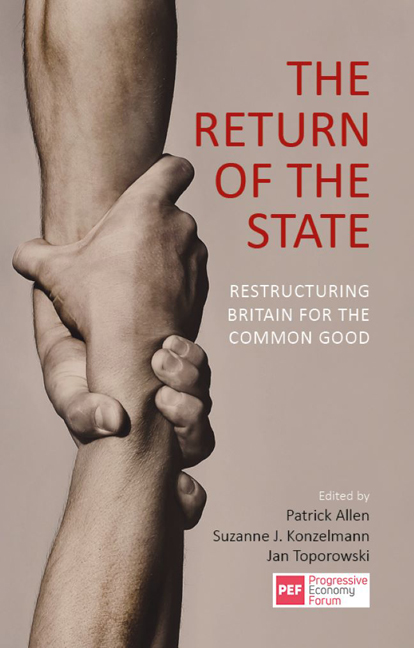10 - Industrial strategy for post-Covid Britain: a renewed public purpose for the state and business
Published online by Cambridge University Press: 22 December 2023
Summary
There is no doubt that the UK economy will take a big hit from the Covid-19 pandemic. Estimates of its actual impact vary, but, at the time of writing, most commentators put the figure at between 11 and 14.5 per cent. To put that into perspective, following the 2007–09 financial crisis, between the first quarter of 2008 and the second quarter of 2009 the UK economy shrank by a little over 6 per cent, and it then took five years to regain its pre-crisis size. The sheer scale of the Covid-19 impact means that the state's support for the recovery will need to include an industrial strategy – something that Britain has not seen in over 40 years.
The nature and effectiveness of that strategy will largely depend upon the relationships between government and the various industrial sectors; much will also hinge on the question “What are companies actually for?”. From Margaret Thatcher's election in May 1979 until very recently, the answer was a very definite “Making profits and delivering value to shareholders”. But fallout from recent events, reminiscent of the interwar years, proves that it is just not that simple.
Beyond profit: the question of corporate purpose
Part of the United Kingdom's response to the 2007–09 financial crisis was to bail out financial institutions deemed “too big to fail”. The fear was that, had they not been rescued, the resulting damage would be more than purely economic. The social dislocation resulting from account holders having no access to funds, losing their savings or being unable to pay their mortgages – plus the consequences of increased unemployment caused by the “Great Recession” that followed – would have been enormous.
The bailouts were therefore a de facto admission that businesses are indeed about more than profit. If that message needed any more reinforcement, it came in the form of admissions, by every government since 2008, that the economy needed rebalancing, with a new emphasis on manufacturing. We have yet to see any action, though. As it stands, the government's proposed post-pandemic recovery programme offers a lot of infrastructure investment; but, inexplicably, both industrial strategy and a business bank remain absent.
- Type
- Chapter
- Information
- The Return of the StateRestructuring Britain for the Common Good, pp. 125 - 136Publisher: Agenda PublishingPrint publication year: 2021



